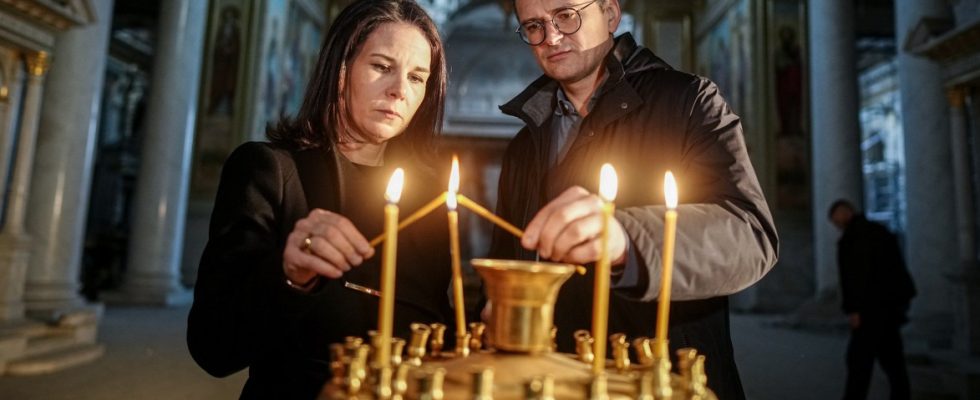Foreign Minister Annalena Baerbock (Greens) arrived in Ukraine on Saturday afternoon for a previously unannounced visit. On the occasion of the second anniversary of the Russian attack, she first traveled to the port city of Odessa on the Black Sea to express Germany’s solidarity with Ukraine and its continued support.
She was accompanied by the country’s Foreign Minister, Dmytro Kuleba, who, like Baerbock, had previously taken part in special sessions of the UN Security Council and the UN General Assembly in New York. From there, Baerbock flew with him to Berlin and on to Chișinău, the capital of the Republic of Moldova. They traveled overland to Odessa.
At the border between Moldova and Ukraine, the Foreign Minister recalled that at the crossing in Palanca after the Russian attack, tens of thousands of people tried to get to safety in neighboring Moldova. She had already visited the border station once in March 2022.
Kuleba said that in the two years since the Russian attack, Ukraine had made history. Back then, no one believed that their country would survive. Today it is clear that “Ukraine is not alone and has strong friends.” There is much more certainty about his country’s ability to resist Russian aggression. There are more reasons to be proud as a European in 2024 than he could have imagined back then. He was also optimistic about Ukraine’s integration into the European Union.
Odessa was the target of Russian air strikes on Saturday night
Odessa became the target of Russian air strikes on Saturday night. A civilian died in a drone attack and a residential building was severely damaged. The Ukrainian army’s anti-aircraft defense intercepted more missiles. The day before, three people were killed in an attack on a shopping center in Ukraine’s third-largest metropolis, which had more than a million inhabitants before the war.
In Odessa, Baerbock first visited the port in the late afternoon, which is of greatest importance for Ukraine’s grain exports and foreign trade. Large quantities of iron ore and coal are also shipped there, as are other agricultural products such as sunflower oil. Russia has repeatedly attacked facilities there with rockets, cruise missiles and drones, and destroyed silos and other storage facilities, as well as quays and ships.
Baerbock had accused Russian President Vladimir Putin in New York of bombing the ports in Ukraine “to prevent Ukrainian grain from being exported abroad.” He thereby “used food as a weapon.” Ukraine is one of the largest grain producers in the world. Developing and emerging countries in particular rely on deliveries from there; UN organizations such as the World Food Program (WFP) have also purchased large quantities of wheat for their emergency aid programs there.
Russia also attacked shipping in the Black Sea. With the mediation of Turkish President Recep Tayyip Erdoğan, there were temporary corridors in 2022 that were intended to continue to make exports possible. The Ukrainian armed forces are now in a position to protect the strategically important infrastructure in the port with modern Western anti-aircraft defenses.
Grain exports from Odessa have returned to pre-war levels
In addition, Ukraine has used attacks on the Russian Black Sea Fleet to push it back so far from the western part of the sea area that grain exports via Odessa have now returned to pre-war levels. Ukraine had set up further export routes with the help of the EU via inland ports on the Danube; these will continue to be used.
Ukrainian troops sank several Russian warships, including the flagship of the Black Sea Fleet, the guided missile cruiser Moscow. According to the intelligence service from Kiev, Ukraine has now put a third of the unit out of action. It also attacked the Russian headquarters in Sevastopol on the Crimean peninsula, which has been occupied by Moscow since 2014, presumably using cruise missiles provided by Great Britain and France.
Russian President Putin announced on Tuesday that Russian troops would advance further into Ukraine to build on their successes on the battlefield. He made the comments after Ukraine withdrew from the embattled town of Avdiivka. Dmitry Medvedev, deputy chairman of the Russian Security Council, said Russia wanted to take Odessa and spoke of a “Russian city.”
Also on Saturday, EU Commission President Ursula von der Leyen and the heads of government from Italy, Canada and Belgium visited Kiev as a sign of solidarity. Von der Leyen, Giorgia Meloni, Justin Trudeau and Alexander De Croo traveled together by train from Poland that night, the Italian government said. A video conference of the G-7 states was planned for the course of the day, to which Ukrainian President Volodymyr Zelenskiy was also scheduled to join.

